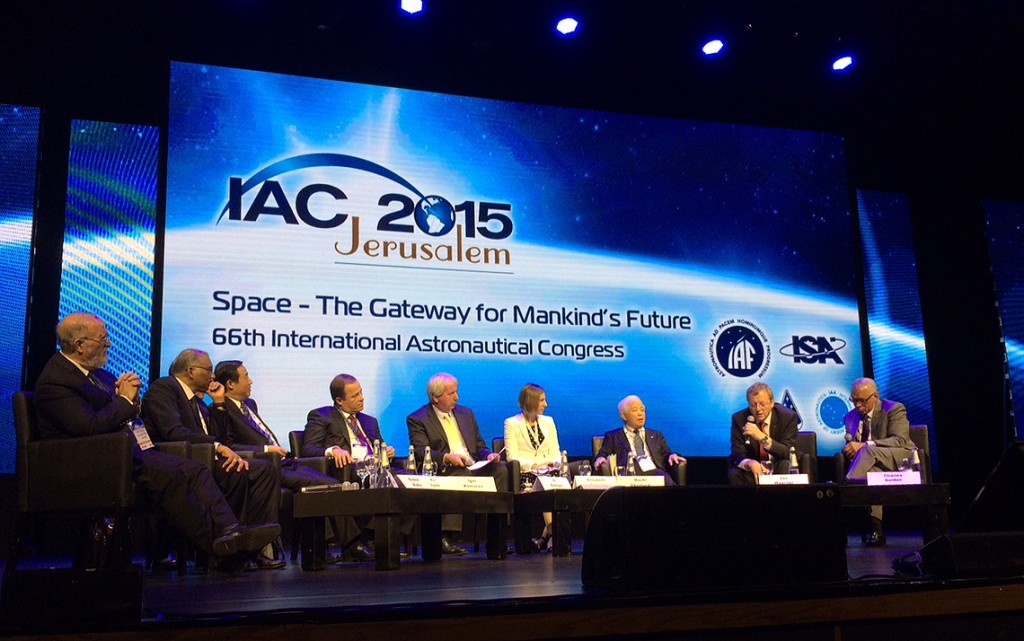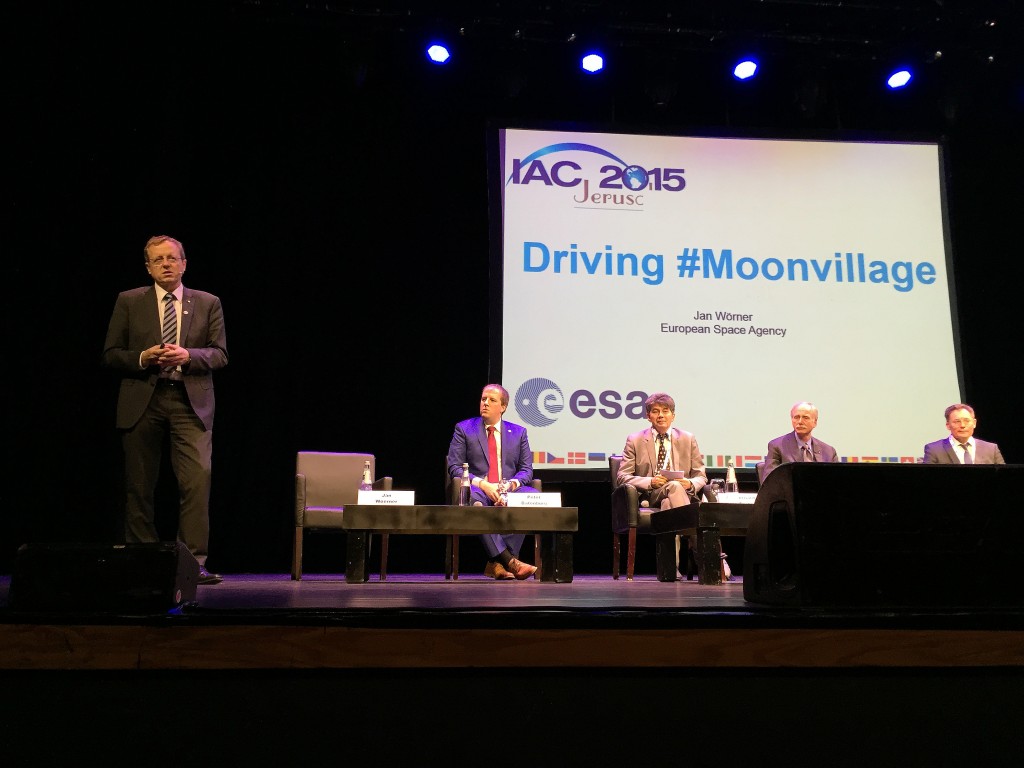The 66th International Astronautical Congress (IAC) took place last week in Jerusalem. Already before travelling to Israel the question of security was raised. As the conflict in Israel and especially in Jerusalem developed, my responsibility as DG was to say clear words on whether to go or not.

The International Astronautical Congress (IAC) 2015 Heads of Space Agencies Plenary 1, featuring with Isaac Ben-Israel, ISA, Charles Bolden, NASA, Xu Dazhe, CNSA, Igor Komarov, Roscosmos, Krisha Murthy, ISRO, Naoki Okumura, JAXA, Jan Woerner, ESA. Moderators: Uli Bobinger and Elizabeth Seward. Image credit: ESA, CC BY-SA 3.0 IGO
While this question seemed to be a rather simple one with regard to minimising any risks to staff, in reality more aspects had to be considered, namely refusing to allow violence to disrupt international cooperation. Thus, taking into account both individual vulnerability and the wish to be a partner in a global world, I decided to go and to give staff my backing for their individual decision, whether they decided to go or not.
During our stay in Jerusalem the situation evolved, especially with an attack in the very close vicinity of the Congress venue. Additional security advice was drawn up and distributed to ESA staff attending the Congress. All of the participants in the Congress now have a different perspective on a truly difficult situation we usually only get to know about through news reports in the media.
The Congress itself was full of inspiring moments: I took part in the meetings of young professionals, parliamentarians, Women in Aerospace and of the members of the International Astronautical Academy, as well as several “bilateral meetings” with the heads and senior staff of other space agencies. During the whole week one could meet space people from around the world and discuss a broad variety of topics linked to space, ranging from political issues to technological details.
It was the young participants in particular who impressed me – and others – with their desire to further develop space activities beyond national borders, always with clear goals in mind.
One of the key questions was the next global activity after the ISS. In several statements the different players explained their views and one could observe some convergence. My contribution concerning a joint activity based on a set of goals, requirements and demands was well received, even if no final commitment was given. It is clear that global challenges such as climate change and disasters have a direct link to space activities, and the monitoring of climate-relevant gases needs a global observation effort in order to achieve global acceptance.
The European participants also discussed the current situation with regard to migration and the possibilities for space to help in this issue. In these discussions the observation of refugee flows as they evolve as well as the influence we can have on improving the situation in the states of origin so that people can stay in their countries were covered.

“The Moon – a continent and a gateway for our future” – a snapshot from #IAC2015 Plenary 7. Credit: ESA, C. Diener, CC BY-SA IGO 3.0
The main area of interest for the younger generation was space exploration: the journey into deep space inspires the post-Apollo generation. They expect a clear vision with a real chance of it becoming a reality in the near future. My idea of a Moon Village – again, not to be understood as a set of houses, a church and a school on the Moon, but rather as the contribution of several scientific missions of a different nature settling on it – is a proposal that combines goals and demands with the possibility of global cooperation. As the different space-faring nations have different cultures and different capabilities, the main aspect will be to cooperate based on synergies taking into account national diversity on goals such as science, technology development, direct benefits for citizens, providing inspiration, and pioneering.
On the very last day of the Congress the bids from Vienna and Bremen for IAC 2018 were evaluated and voted on. Both were of excellent quality. The final proposal to give Bremen the privilege of hosting the Congress this time round was accepted by the General Assembly. In the same meeting, Jean-Yves Le Gall, President of CNES and Co-Chair of the ESA Council, was elected to be the next IAF President. Congratulations!

Discussion: 4 comments
It’s good to read your blog post, Jan. I’m reading it belatedly because I hadn’t known that it was posted. However, I’m now following @ESA on Twitter as well as @ESAscience, so should read your blog more promptly in future.
I admire your decision to go to the IAC in Jerusalem – not an easy one.
And I’m interested greatly in your idea for a “Moon village” (tho confess I do day dream of village shops!) I recall being excited by the idea when I saw the interview you did together with Jean-Jacques during the handover period of the DG post.
Dear Prof. Woerner,
Thank you for the one of the best answer to hatred – to spare no effort for dialog and more high tech innovations than ever. In fact, RESEARCH CONNECTS!
Sincerely,
Jerzy Zywicki
Dear Mr Woerner
Thank you for sharing your experience and the video.
As a European Space Enthusiast, I am happy about your proposal for the Moon base. And curious if, since the conference, there is some more information about the direction this plan is expected to develop.
Will ESA be bringing communication and GPS-like satellites in Lunar orbit to lower the later barrier for landing and navigation, or can it be done with the current satellites?
And what is considered the essential infrastructure of the base?
I assume 2 energy plants and 4 housing modules (2 computer/communication hubs and 2 living/storage compartments). Will they be split up among the interested big 4 (ESA, China, Russia, India), or will two do the transport and two others build the infrastructure itself?
And can you build the basics expecting missions/commercial partners to expand will follow later?
Like allocating/renting energy and space to missions that want to connect antennae arrays, research modules, rover stations etc.
Or do you need to have defined research missions before you are allowed to design the core infrastructure?
Will ESA be using a CRS-like commercial development program for (European) companies, or will the first stages be done in-house?
After the success of Rosetta, it would be nice to see Europe continue to lead in Space. And rather then taking the big gamble on Mars directly, I would like to see ESA take the long route of the Moon – Phobos – Mars. Working with partners in incremental steps that allow us and our partners to catch up with planning, financing, research, new technology and scientific data.
Looking forward to your reply (and seeing your vision take shape) I await,
M. Bosje
(the Netherlands)
Dear Mr. Bosje,
we invite you to take a look at https://spaceflight.esa.int/humanrobotics/ and hope this website will at least answer some of your questions.